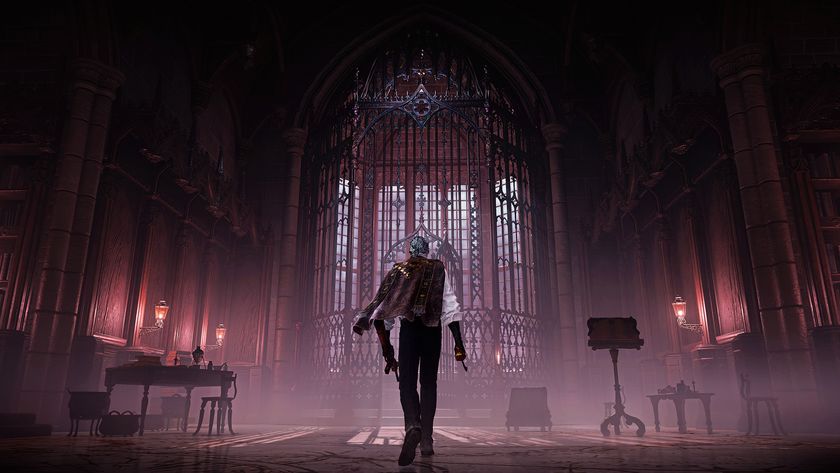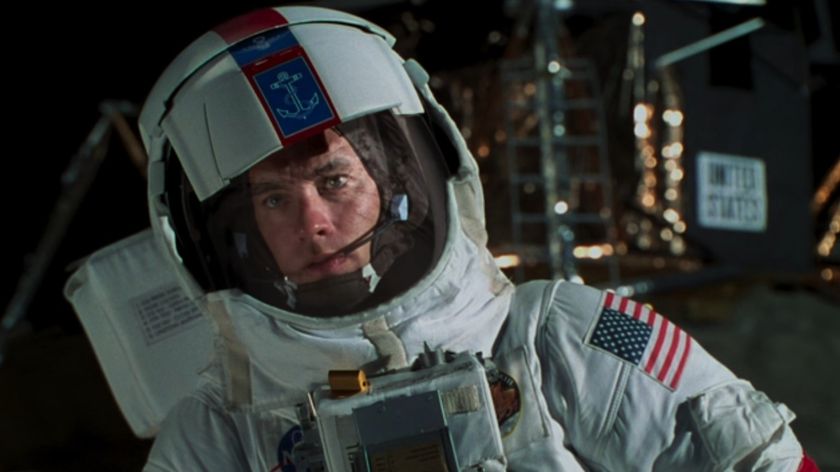The Story Behind The King's Speech
Colin Firth feels a little regal
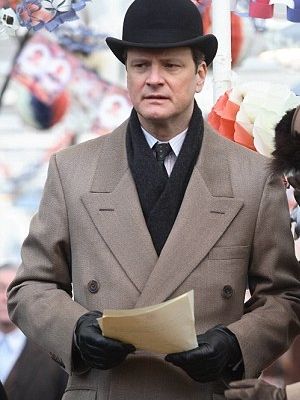
The Kings Origins
Britain is the home of the royal biopic. From Elizabeth and Henry V to The Queen , our hallowed shores have championed historical re-tellings of our most blue-blooded of rulers. And considering how many monarchs our little island has played host to over the years, it’s no surprise that filmmakers continue to transform their luscious histories into motion pictures.
King George VI (born Albert, Duke of York), who reigned from 1936 until 1952, has appeared on screen numerous times. He was played by Andrew Ray in the ’78 mini-series Edward And Mrs Simpson , by Anthony Andrews in the BBC’s Cambridge Spies and James Wilby in Bertie And Elizabeth . But he’s never been played by Colin Firth…
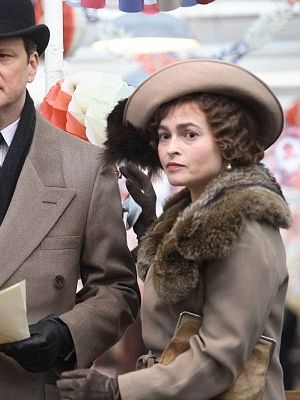
The Kings Troubles
Until the seeds were sewn in 2006, that is. Early that year, producer Joan Lane was sent a stage play script entitled The King’s Speech . Telling the story of King George VI (aka Bertie, aka the father of Queen Elizabeth), it details his struggles with a stutter as he assumes the throne. The script eventually landed on the desk of actor Geoffrey Rush and director Tom Hooper.
Hooper, though - no stranger to costume dramas having helmed Love In A Cold Climate and Daniel Deronda for the BBC - would find financing a bit of a problem. “The truth is that The King’s Speech , which is great material,” he says, "people weren’t lining up to finance it.” A Firth wouldn’t hurt…
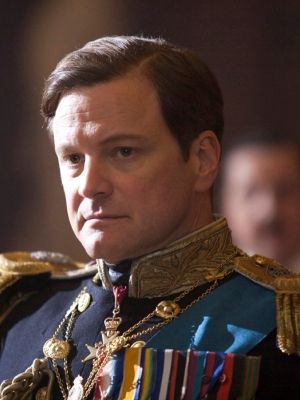
The Kings Cast
“With Colin, I was just very lucky that I ended up with the right man doing it,” says Hooper. With Firth fresh from A Single Man and interested in playing the stammering King George VI, Hooper was sure that he’d bagged the perfect leading man for his film.
“I’m such a believer that you got to get the casting right,” the director stresses. “Not 10 percent off, but true and right. It’s tough to do because there’s only a certain number of actors who can attract the finance and who are also great.” For the now defunct UK Film Council, Frith's involvement was all the convincing they needed, and they quickly awarded the film £1m to get it off the ground…
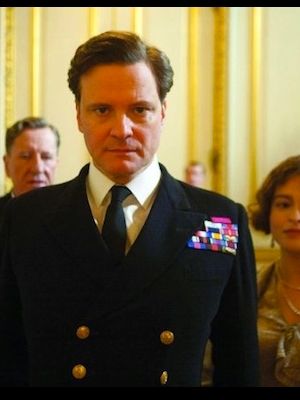
The Kings Life
For Firth, stepping into the shoes of a king would have been much easier if he’d been able to meet the king himself. “So much is a mystery,” he reasons, “and the flow of information out of the palace is non-existent. If you play a role you want to familiarise yourself with that person's world.”
Firth did manage to attain an audience with Prince Charles, though he admits that he didn’t learn too much. “I didn't find anything out about him, because this man's job is to be on duty all the time. You get the graciousness, he's very good at it, he has a private secretary marshalling him to the next person to spend a few seconds with them. I guess I could learn from that just watching how everyone behaved around him.” Now he needed a wife…
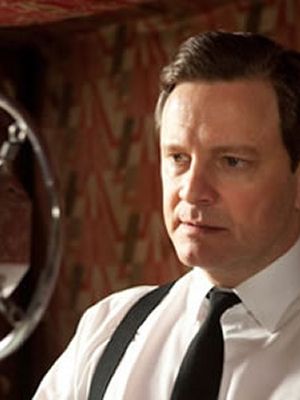
The Kings Mum
“I just do queens lately and witches,” admits Helena Bonham-Carter, who signed on to star opposite Firth as his supportive wife, Elizabeth (better known in later life as the Queen Mum). Having just come off Alice In Wonderland , Elizabeth is luckily far more subdued than the Red Queen.
Bonham-Carter almost didn’t end up doing the film, though, thanks a certain boy wizard. Her contract with the Harry Potter people meant they got first dibs on her time. “It's kind of like the Queen Mum turned Bertie's marriage proposal down twice and the third time she accepted, and that was kind of like me and Tom really,” the actress says. “I kept saying ‘No.’ In fact, I don't think I said ‘Yes’ but I ended up on the set, dressed as the Queen Mum.” Time to start filming...
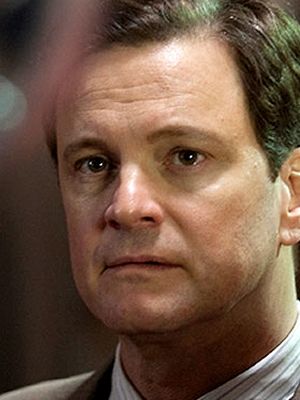
The Kings Duty
Filming on The King’s Speech commenced on 13 November 2009. With a seven week schedule to get through, the film crew visited Southwark, Ely Cathedral and Battersea Power Station for various scenes.
Bonham-Carter, meanwhile, felt a certain amount of duty to get her portrayal of the Queen Mum right. “I mentioned [ the film ] to Prince Charles – he was at the premiere of Alice – and he was very interested. It's all done with immense respect and compassion, so hopefully they'll approve of it. Having said that, if I saw a biopic of my mum or my dad, it's bound to get things wrong. I hope they're moved by it as much as anybody else.” Right down to the stammer…
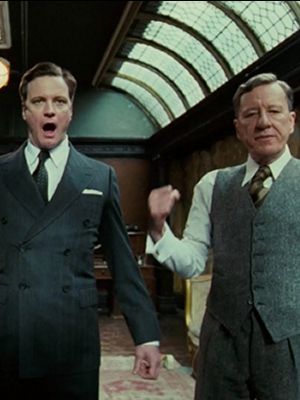
The Kings Stammer
For Firth, The King’s Speech was the second time he would be required to act with a stutter, having played a chronic stammerer in Three Days Of Rain .
“I've twice played a character with a stammer,” he says, “but it was different every time. None of that helps. It's a different guy, he has different issues he has a different way of dealing with things because he was a different person.
“You have to find something which is not only authentic and expressive, but which is also very specific to this person. You also have to find something that doesn’t alienate the audience, that doesn’t slide into some sort of pastiche. This is where I had to work very closely with Tom.” As well as a speech therapist…
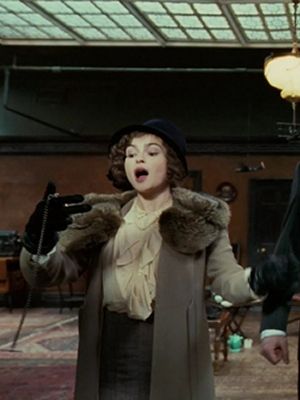
The Kings Therapist
While prepping for the film, Firth turned to a family member to help figure out how to approach his character’s stutter. His sister is a voice therapist, and proved “extremely helpful in terms of the exercises that can be done”.
A speech therapist was also enlisted during rehearsals. In the end, though, Firth relied on the script for the most help. “I think the best consultant I had was David Seidler the screenwriter,” he says, “he was so compelling about the experience and what you do in life to negotiate around the speech problems that you have. The fact that it has a profound affect on your identity, because you don’t do what you want to do. That insight and what my sister gave me were definitely the most useful help I got.”
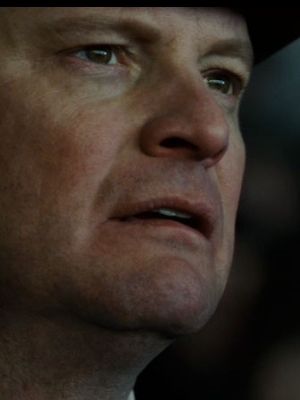
The Kings Look
The King’s Speech continued filming until 17 January 2010. Director Hooper paid particular attention to ensuring the film felt cinematic in scale, rather than resembling another BBC costume drama. “I think one of the things I worked on early was the close-up because of the amount of dialogue and the nature of the emotions that Helena was going to go through,” he explains.
“I also began to think, ‘What is the visual analog? It’s stammering. How do I find a way to shoot Colin that will underline his predicament?’ I began to think that if you’re a stutterer, it’s about inhabiting silence, emptiness, and nothingness. Therefore, is there a way visually of talking about that? So I wanted to put Colin’s face in these close shots in constant relation to negative space.” Talking of thematics...
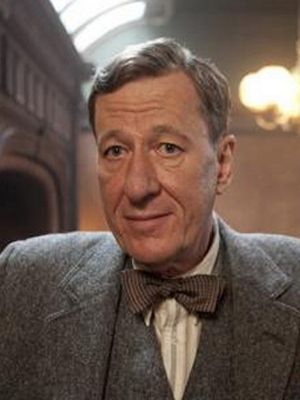
The Kings Themes
While enjoying sinking his teeth into a meaty role, Firth also relished unravelling some of the themes that were at play in his historical drama.
“The whole thing is it’s about the possibilities or impossibility’s of one human being reaching another one,” he muses. “Are we ever capable of doing that, you can’t, even with your own children you can’t fully, you’d love to be able to reach in and take someone’s pain away but you can’t.
"The fact that the man is a member of the royal family means the challenges are very explicit in a way. You can’t even call him by his first name, you’ve got to plough through a bunch of titles, you have to bow and the man refuses to allow any more intimacy than that. It starts off with a complete lack of trust.” There’s also a lot of anger…
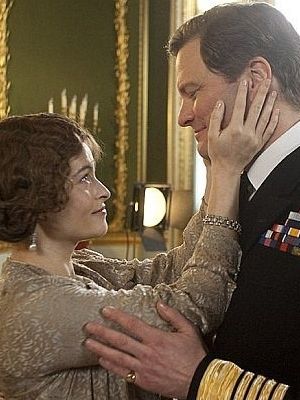
The Kings Rage
“Because I didn't know anything about him, everything was a surprise,” Firth says. “I didn't know he had this huge temper, but he did. So did his father and so did his grandfather apparently. Whether you put it down to running in the family, or the fact that all your channels of communication are blocked and you're a smart person, and if you do manage to get something out nobody wants to hear it anyway.
“Even the outlet of writing is knocked out of you because you're left-handed. It's a pretty explosive cocktail, if you bottle up a person like that. I would say his rages are completely understandable, and they were an issue.” Enter Logue…
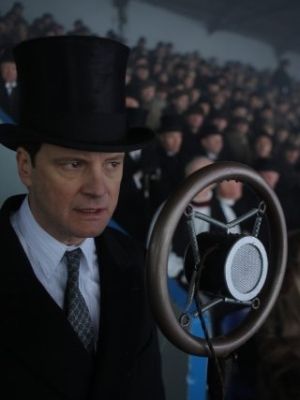
The Kings Help
Meeting unconventional therapist Lionel Logue (Geoffrey Rush) helps Bertie to confront his speech impediment, and tame it into a degree of submission. Firth, though, insists that The King’s Speech is far too clever a movie than to attribute just one moment – such as Bertie meeting Lionel – to a man’s transformation.
“I think what I admired most about the structure of this piece is that it doesn’t pivot on one moment,” he says. “Like any credible relationship portrayal it ebbs and it flows, it has breaking points, it’s cyclical, it’s like a marriage. You see that trust being tussled over the whole time.”
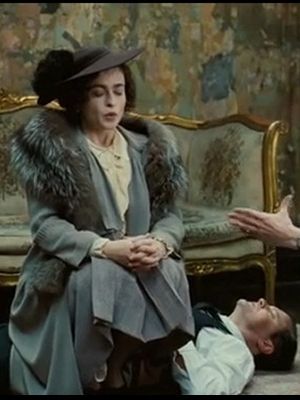
The Kings Rating
With the final cut of The King’s Speech edited by 31 August, 2010, the film was awarded a controversial 15 certificate by the BBFC. Director Hooper was appalled, calling the rating system prejudiced against bad language. The certificate was swiftly downgraded to a more reasonable 12A.
“I don't need to rail about it, because I haven't found anyone who disagrees,” says Firth. “I've got small kids, so I don't think this is a non-issue. It's not, ‘Bring your kids to hear the F-word!’ It's interesting, this case, it's a very special case. I have a seven-year-old, and I take him to football games, and the stuff you hear there would make this sound like The Sound of Music . If you can make an exception this is definitely one case for that.”
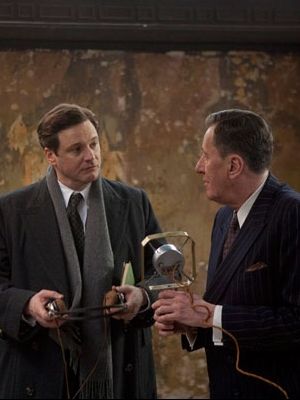
The Kings Oscar
The King’s Speech had its world premiere at the Telluride Film Festival in September 2010, before going on to receive a standing ovation and the People’s Choice Award at the Toronto International Film Festival. Inevitably, Oscar buzz is quickly building.
“I don't know if it's necessary,” says Firth, who lost out at last year’s Oscars. “It can help a small movie enormously. Something like A Single Man it was tiny, it was financed by one guy, we all lost money doing it. What to us felt like a small movie, what would have been a way off-stream movie, is suddenly very successful and very mainstream. And that's because of the response out of these festivals. If people are talking about awards, it's because of that.” More kudos was to come….
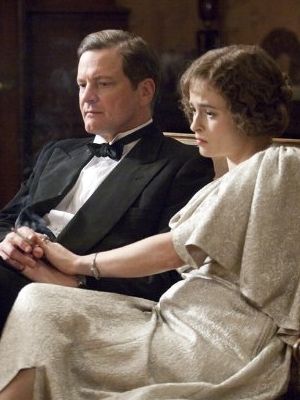
The Kings Kudos
Touring just about every festival in the US for the remainder of 2010, as well as here in Britain, The King’s Speech went on to grab more gongs, notably from the New York Film Critics Circle Awards, the Satellite Awards and the British Independent Film Awards.
Hooper remains wary about all the Oscar talk, though. “I kind of want to take it every day as it comes and not make any assumptions,” he says. “I’m just thrilled at the response we’ve had and the awards we’ve won. The Audience Award at Toronto was an unbelievable thing to win.” Finally, the film’s getting a commercial release…
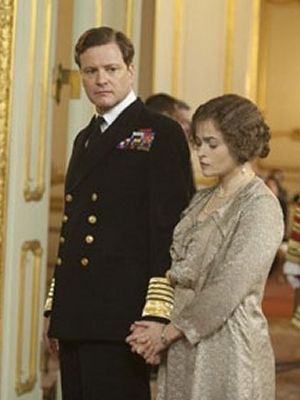
The Kings Speech
Released in the UK on 7 January, The King’s Speech looks primed to be a runaway hit. Surfing a wave of critical acclaim, it has proved that the British biopic is alive and well – and is a fitting reminder of what our home-grown talent is capable of. For Firth, it’s a well-drawn character piece that never takes the easy route.
“He didn’t overcome it,” the actor says of Bertie’s stammer. “And I don’t think the film shows him overcoming it. I think it shows him having an arrangement with it. Where he’s not going to let it stop him from doing his job. You know, that last speech you still see him fighting. He fights for every word. The Queen, Churchill and the rest are on the edge of their seat 'til the end. So, he overcomes the debilitating fear of it – but he doesn’t overcome the fact that he’ll always have the obstacle.”
Josh Winning has worn a lot of hats over the years. Contributing Editor at Total Film, writer for SFX, and senior film writer at the Radio Times. Josh has also penned a novel about mysteries and monsters, is the co-host of a movie podcast, and has a library of pretty phenomenal stories from visiting some of the biggest TV and film sets in the world. He would also like you to know that he "lives for cat videos..." Don't we all, Josh. Don't we all.
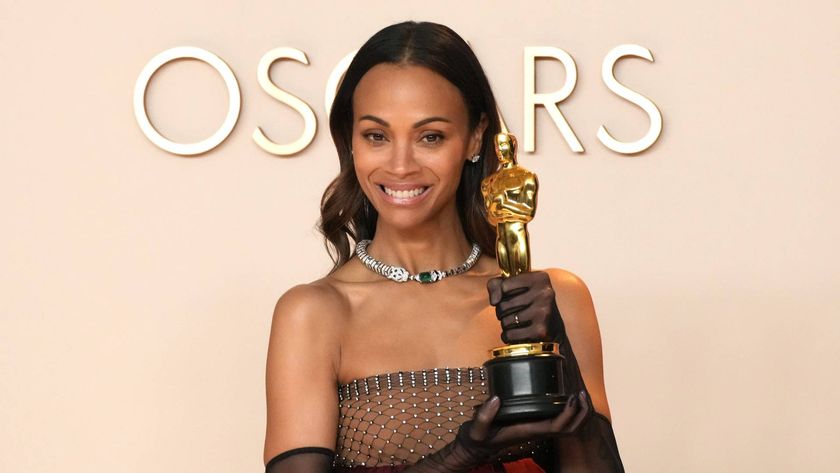
James Cameron responds to Zoe Saldaña's Oscar win: "I was so happy to see Zoe acknowledged as the world-class performer we, in the Avatar family, have always known her to be"
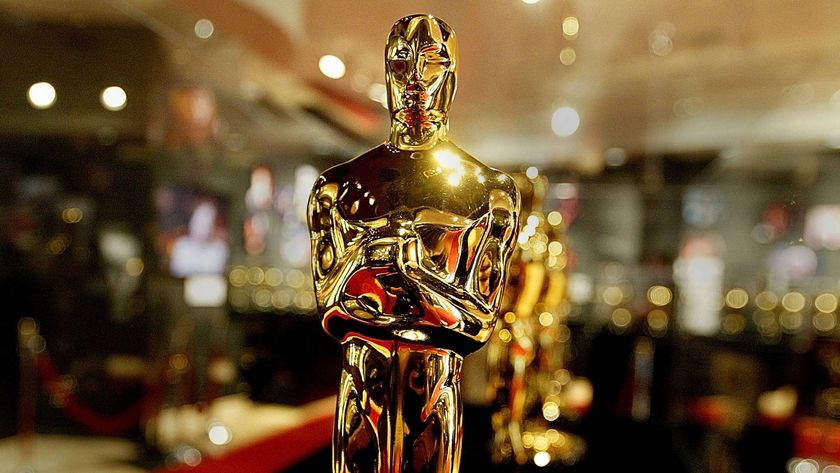
2025 Oscar winners in full: Anora wins big as The Brutalist and Wicked pick up multiple awards

James Cameron responds to Zoe Saldaña's Oscar win: "I was so happy to see Zoe acknowledged as the world-class performer we, in the Avatar family, have always known her to be"

2025 Oscar winners in full: Anora wins big as The Brutalist and Wicked pick up multiple awards



